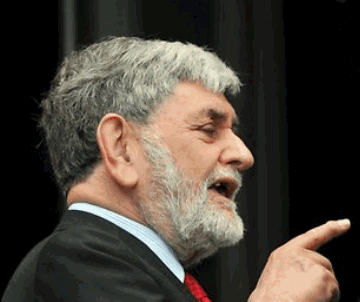|
|
|
|
|
|
|
News & Views item - June 2013 |
![]() Barry Jones Socks It to 'Em at the Australian College of Educators Dinner.
(June 24, 2013)
Barry Jones Socks It to 'Em at the Australian College of Educators Dinner.
(June 24, 2013)
 The
opening sentence in Wikipedia's entry for Australia's former Minister for
Science (1983-1990) reads: Barry Owen Jones AO, FAA, FASSA, FAHA, FTSE, FACE
(born 11 October 1932) is an Australian polymath: writer, lawyer, social
activist, quiz champion and former politician.
The
opening sentence in Wikipedia's entry for Australia's former Minister for
Science (1983-1990) reads: Barry Owen Jones AO, FAA, FASSA, FAHA, FTSE, FACE
(born 11 October 1932) is an Australian polymath: writer, lawyer, social
activist, quiz champion and former politician.
Last week he fronted the annual dinner of the Australian College of Educators in Melbourne. His address, "Education as commodity? How creativity fell off the agenda and labour market factors took over. Will Gonski be the solution?" isn't available online but The Australian's Andrew Trounson was present and reports Mr Jones believes politicians too narrowly view public education as "training" people for the workforce, undervaluing the importance of creativity, art and music in building resilience and meaning for individuals, and equipping them to deal with complexity.
How far along the continuum do we want to move - all the way to Bach, Michelangelo, Dostoevsky, Stravinsky, Joyce and Picasso, or do we get off at 'The Biggest Loser' or 'Fifty Shades of Grey'.
He said education was now dominated by "pedagogy" that promoted training and conformity rather than the personal growth and creativity fostered by real education.
The pedagogue (in Ancient Greece) was the slave who escorted children to school and I am puzzled that many who use the term haven't speculated about its origin.
He noted that at Kevin Rudd's 2020 Summit in 2008 at which education was shunted into the productivity agenda and the small number of educationalists present were
outgunned by union officials, business leaders and lobbyists to whom public education means training for the existing labour force, not education for creativity, personal development or life long learning.
And politics was now dominated by "spin" and debates had become anti-intellectual and anti-science.
Mr Jones' parting shot:
"I hesitate to put the proposition that the relationship between graduate
numbers in the community and the quality of political debate is inverse, but it
could be seriously debated. We appear to be lacking in courage, judgment,
capacity to analyse or even simple curiosity, except about immediate personal
needs."